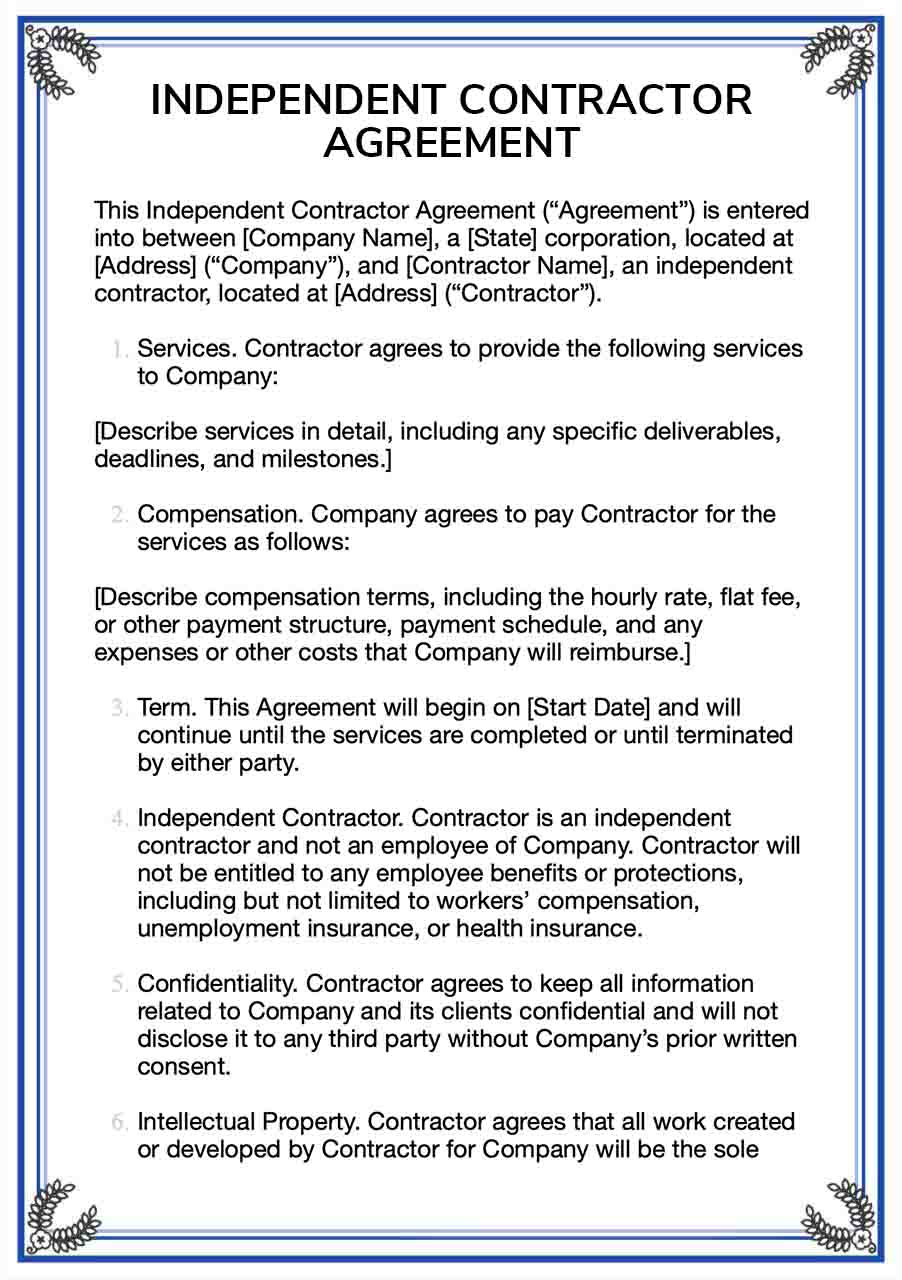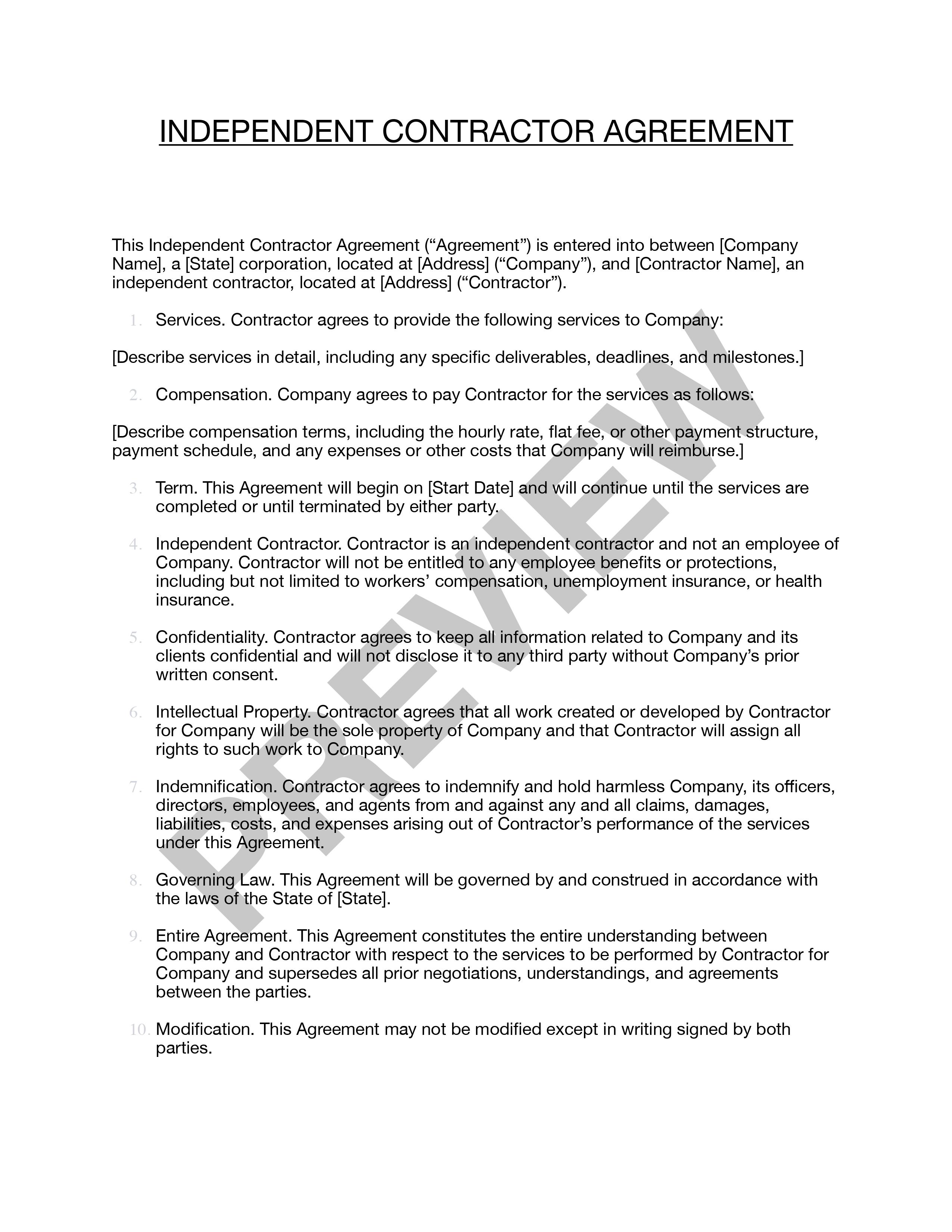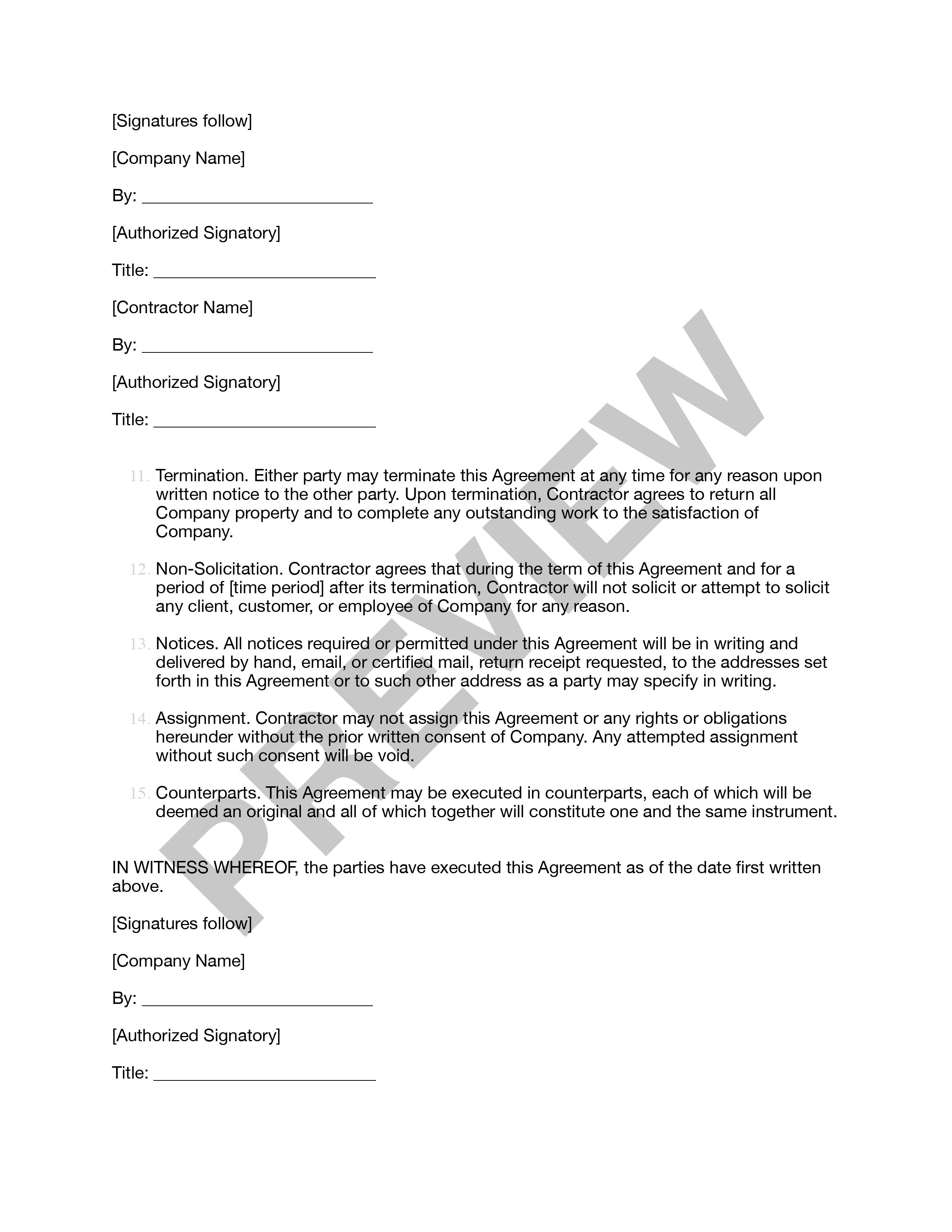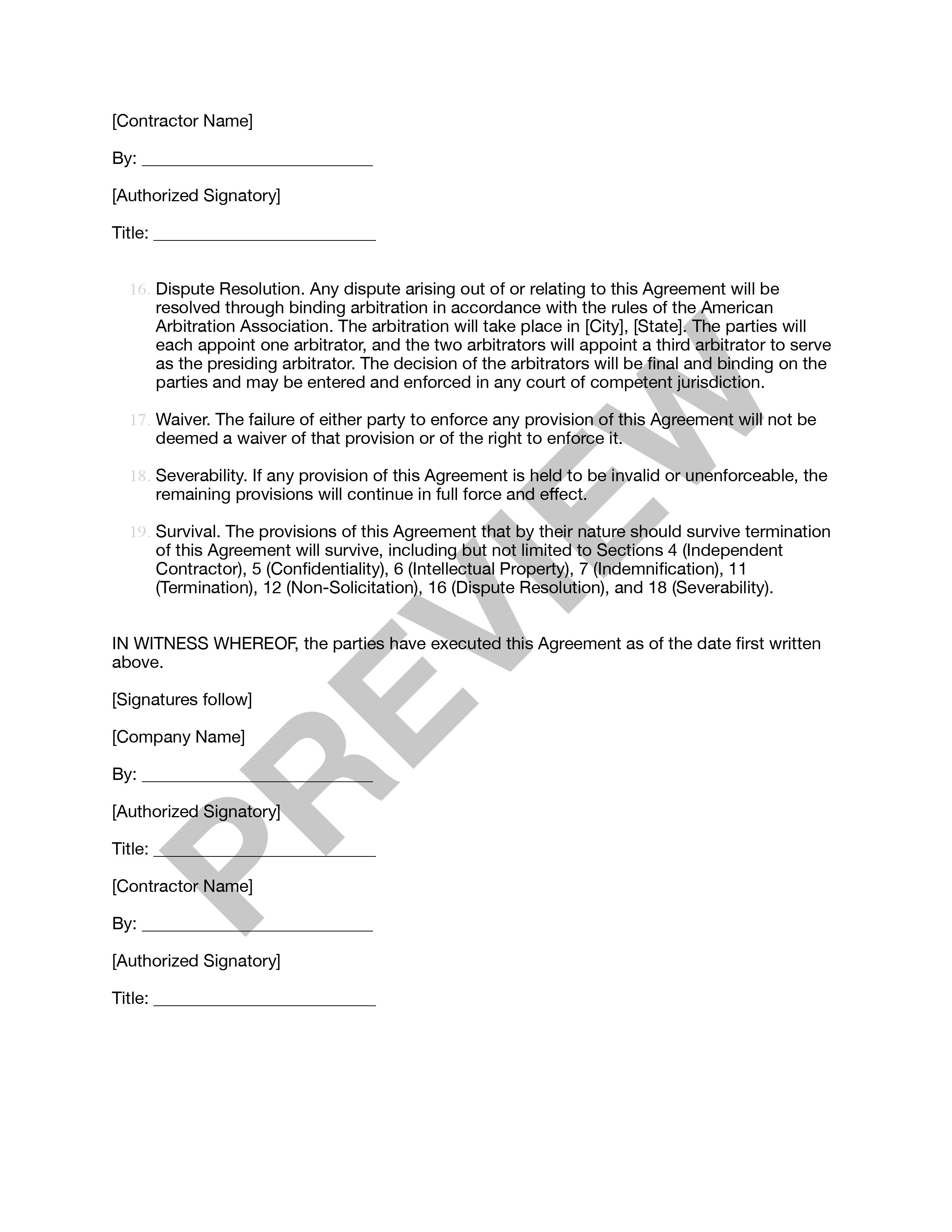Generate Independent Contractor Agreement
An Independent Contractor Agreement is a legal document that outlines the terms and conditions of a business relationship between a company and an individual contractor.
Last Updated April 2023
Alternative names:
Consulting Agreement Freelance Agreement Service Agreement 1099 Contractor AgreementWhat is an Independent Contractor Agreement?
An Independent Contractor Agreement is a legal document that outlines the terms and conditions of a business relationship between a company and an individual contractor who is engaged to perform certain services. This agreement establishes the terms of the relationship, including the scope of work, payment terms, confidentiality, intellectual property ownership, and other key provisions.
In general, an independent contractor is a self-employed individual who provides services to a company on a project or assignment basis. Unlike employees, independent contractors are not subject to the same tax withholding requirements, employment benefits, or legal protections under labor laws.
The Independent Contractor Agreement is designed to clearly define the relationship between the company and the contractor to ensure that both parties understand their rights and obligations under the arrangement. It is an important document that can help prevent misunderstandings and disputes, as well as provide legal protection for both parties in the event of a disagreement.
What is the difference between an independent contractor and an employee?
The difference between an independent contractor and an employee is based on several factors, including the level of control over how work is performed, the degree of independence and autonomy, and the nature of the relationship between the worker and the employer. Here are some of the key differences:
-
Control: An independent contractor typically has more control over how they perform their work than an employee does. Independent contractors are generally able to determine their own schedule, use their own tools and equipment, and decide how the work will be done. Employees, on the other hand, are typically subject to more control and direction from their employer.
-
Independence: An independent contractor is generally seen as operating their own business, while an employee is seen as working for someone else's business. Independent contractors typically work on a project-by-project basis, and are free to work for multiple clients at the same time. Employees, on the other hand, generally work for a single employer on an ongoing basis.
-
Taxes and benefits: Independent contractors are responsible for paying their own taxes, including self-employment taxes, and are generally not eligible for employee benefits such as health insurance or retirement plans. Employees, on the other hand, have taxes withheld from their paychecks and are typically eligible for benefits.
-
Liability: Independent contractors are generally responsible for their own liability and insurance, while employees are covered by their employer's liability insurance.
-
Labor laws: There are different labor laws that apply to independent contractors and employees. For example, independent contractors are not covered by minimum wage or overtime laws, while employees are.
It's important to note that the distinction between independent contractors and employees is not always clear-cut, and can vary depending on the specific circumstances of a particular working arrangement.
What should be included in an Independent Contractor Agreement?
An Independent Contractor Agreement should include the following information:
-
Identification of the parties: The agreement should identify the client and the independent contractor, along with their contact information.
-
Scope of work: The agreement should specify the services the independent contractor will provide, the time frame in which they will be provided, and any milestones or deadlines that must be met.
-
Compensation: The agreement should outline the payment terms, including the rate or fee to be paid to the independent contractor, and when and how payments will be made.
-
Ownership of work product: The agreement should specify who will own any work product created by the independent contractor during the course of the project.
-
Confidentiality and non-disclosure: The agreement should include provisions that protect the confidentiality of any information shared between the parties during the course of the project.
-
Termination: The agreement should specify the conditions under which the agreement can be terminated by either party.
-
Representations and warranties: The agreement should include statements from both parties that they have the legal authority to enter into the agreement, and that they will comply with all applicable laws and regulations.
-
Indemnification: The agreement should include provisions that protect each party from any claims or losses arising from the other party's actions or omissions.
-
Governing law: The agreement should specify the state or jurisdiction whose laws will govern the agreement.
-
Signatures: The agreement should be signed by both parties to indicate their agreement to the terms and conditions outlined in the document.
Who typically uses Independent Contractor Agreements?
Independent Contractor Agreements are typically used by businesses or individuals who hire independent contractors to perform specific tasks or projects. This can include:
-
Small business owners: Small business owners may use Independent Contractor Agreements to hire independent contractors for specific projects or to provide services on an ongoing basis.
-
Freelancers: Freelancers who work independently may use Independent Contractor Agreements to outline the terms and conditions of their work for clients.
-
Consulting firms: Consulting firms may use Independent Contractor Agreements to hire independent contractors to work on projects for their clients.
-
Tech companies: Tech companies may use Independent Contractor Agreements to hire software developers, designers, or other specialized workers on a project-by-project basis.
-
Construction companies: Construction companies may use Independent Contractor Agreements to hire independent contractors for specific construction projects.
-
Non-profit organizations: Non-profit organizations may use Independent Contractor Agreements to hire independent contractors for fundraising, event planning, or other projects.
In general, any business or individual that hires an independent contractor to perform work on a project-by-project basis may use an Independent Contractor Agreement to outline the terms and conditions of the work.
Frequently Asked Questions
Yes, an independent contractor is generally free to work for multiple clients at the same time, including while engaged with your company. This is one of the key factors that distinguishes an independent contractor from an employee, who is typically expected to work exclusively for one employer.
It's important to clarify in the Independent Contractor Agreement whether the independent contractor is allowed to work for other clients or whether they are expected to devote their full time and attention to the work being performed for your company. If you require exclusivity, this should be clearly stated in the agreement.
However, even if an independent contractor is working for other clients, they are still expected to fulfill their obligations under the terms of the Independent Contractor Agreement with your company. This includes completing the work within the agreed-upon timeframe, meeting quality standards, and maintaining confidentiality as required.
Determining the rate or fee to pay an independent contractor can be a complex process that involves a variety of factors. Here are some key considerations to keep in mind:
-
Industry standards: Research industry standards to get an idea of what others in your industry are paying for similar services. You can consult with professional associations or trade groups, or search online job boards and freelance marketplaces to get an idea of the going rate for specific services.
-
Experience and expertise: Consider the experience and expertise of the independent contractor. A more experienced or highly skilled contractor may command a higher rate than someone who is just starting out.
-
Complexity of the project: The complexity of the project can also affect the rate. More complex projects that require specialized knowledge or tools may command a higher rate than simpler projects.
-
Timeframe: The timeframe for completing the project can also affect the rate. If the project requires a quick turnaround or a tight deadline, the independent contractor may charge a higher rate to compensate for the extra work required.
-
Location: The cost of living and the cost of doing business can vary by location, so it's important to take this into account when determining the rate.
-
Other costs: Consider any additional costs that may be associated with the project, such as materials, travel expenses, or equipment rental. These costs should be factored into the overall rate.
In general, any business or individual that hires an independent contractor to perform work on a project-by-project basis may use an Independent Contractor Agreement to outline the terms and conditions of the work.
Yes, an independent contractor can be sued for breach of contract if they fail to fulfill the terms of the Independent Contractor Agreement. The Independent Contractor Agreement is a legally binding contract, and both parties are expected to adhere to its terms. If the independent contractor breaches the agreement, the other party may have grounds to file a lawsuit seeking damages or other remedies. However, it's important to note that if the independent contractor is properly classified and meets the criteria for an independent contractor under the law, they are not entitled to the same benefits and protections as employees.
No, as an independent contractor is not an employee, you are not required to provide benefits such as health insurance, retirement plans, or paid time off. These benefits are typically reserved for employees who are considered part of the company's regular workforce.
However, if you have an agreement with the independent contractor that outlines any benefits or compensation beyond their fee or rate, such as reimbursement for travel or expenses, those terms should be followed. Additionally, certain laws may require independent contractors to receive certain benefits, such as workers' compensation insurance, depending on the nature of the work being performed and the state in which the work is being performed. It's important to consult with legal counsel to ensure compliance with all applicable laws and regulations.
If a dispute arises between the parties to an Independent Contractor Agreement, the first step should be to review the agreement to determine if there are any provisions that address the issue in question. The agreement may contain a dispute resolution clause that outlines the process for resolving disputes, such as mediation or arbitration.
If the agreement does not contain a dispute resolution clause, or if the dispute cannot be resolved through the prescribed process, the parties may need to pursue legal action to resolve the matter. In such cases, it's advisable to consult with legal counsel to determine the best course of action.
In any case, it's important to maintain open communication with the other party and approach the situation in a professional and respectful manner. In some cases, disputes can be resolved through negotiation and compromise, without the need for formal legal proceedings.



